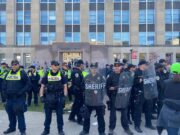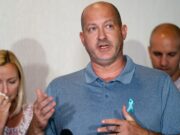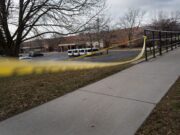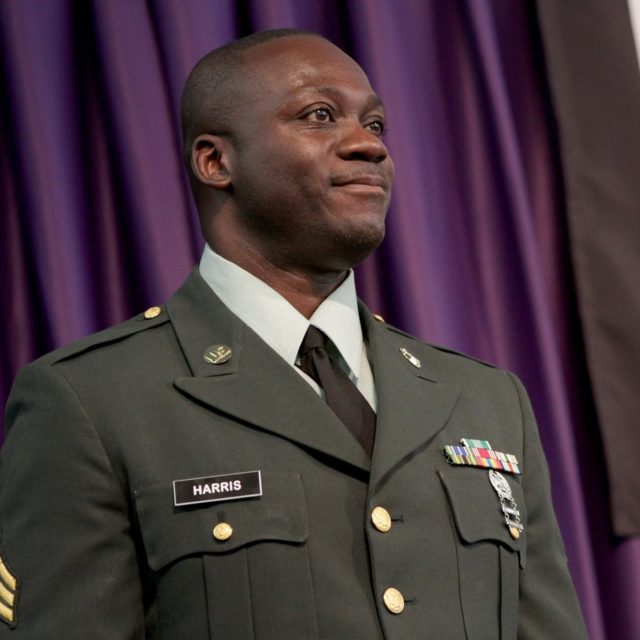The Coordinator of Student-Veteran and Military Services at UW-Whitewater has been placed on administrative leave following an altercation with a student, but the coordinator says the allegations against him are false and part of a pattern of racist and hostile behavior by students and staff, according to documents obtained by Madison365.
Richard Harris, who has held the position since it was created nearly five years ago, was placed on leave Thursday, December 5, according to documents. In emails and official complaints, Harris alleges that the complaint against him is racially motivated, and follows a pattern of workplace retaliation going back to May 2018.
Specifically, Harris alleges that a Naval uniform accessory was fashioned into a makeshift noose and placed in a common space used by veterans on at least two occasions, and that a student said Harris was intimidating because he’s a “big Black guy.”
Madison365 has examined a number of emails and filings, and spoken to current and former students. A UWW spokesman said the university does not comment on personnel matters, and several other university officials either declined to comment or did not respond to messages. Harris said he is not allowed to speak with reporters. The United States Supreme Court has repeatedly found that it is unconstitutional for any government agency, such as a state university, to prohibit its employees from speaking to the press.
The UWW website says Harris served on the Governor’s Task Force on Reducing Minority Unemployment in Milwaukee County, the Task Force on Criminal Justice and Mental Health, and the African American Liaison Committee to the Janesville Police Department. He is a veteran of the first Gulf War and earned his undergraduate degree from UWW and a master’s from the University of Southern California, according to his LinkedIn profile.
An Altercation
According to a complaint filed with UWW Human Resources on Thursday, December 5, Curtis Lemke, President of the Whitewater Chapter of Student Veterans of America, “came forward … with concerns about (Student-Veteran and Military Services Coordinator) Richard Harris’s behavior toward student veterans.” In the complaint, Lemke alleges that Harris engaged in a verbal confrontation with three students, and later another confrontation with Lemke, “verbally trying to intimidate (Lemke).”
In an interview Wednesday, Lemke said the altercation began when two Veterans Administration work-study students scheduled a meeting with Harris because they had not been paid, which has been a long-running issue with VA work-study programs nationwide. Lemke said he assumed Harris was to blame, though, for failing to file proper paperwork with the VA. Lemke said Harris was late to the meeting, and that the students involved texted Lemke seeking assistance.
Both students dispute this, according to records examined by Madison365. “(Lemke) happen(ed) to walk in. I never contacted him because it’s none of his business so why would I?” one of the students wrote in a message to Harris.
Lemke said he and the two students had decided not to wait for Harris but to leave the library, and that they encountered Harris on the way out. Lemke said Harris was immediately agitated and that Harris asked Lemke to leave and allow him to speak with the two VA work-study students.
One of the students stayed to discuss his pay issues with Harris and the other did not, opting instead to leave with Lemke, who later returned to the library and again engaged in a heated exchange with Harris. During this exchange, Lemke acknowledges “asking him if he’s administering this program appropriately or if he’s committing fraud.” He said that accusation angered Harris further, and that Harris followed him toward the library entrance as Lemke was leaving, and that Harris was “yelling” in front of about 100 people.
In emails following the altercation, Harris also alleges that Lemke said during the altercation, “and you wonder why the black tie keeps showing up in here (multi-media resource room).”
In other emails, Harris writes that on two occasions, the black neckerchief had been taken off of a Naval uniform display and hung from a doorknob turned upside down so that it resembled a noose. Harris wrote that he didn’t understand that it was supposed to be a noose until Lemke made that remark.
Lemke denied knowing or saying anything about the black ties.
Toward the end of the confrontation, according to emails from Harris, Lemke said he found Harris intimidating because Harris is a “big Black guy.”
Lemke acknowledged saying something to that effect, adding, “I guess I partially regret what I said just because of the connotation,” but stood by his assertion that Harris was acting in an intimidating manner.
“He’s 6’6″, he’s towering over me right in my face, yelling at me, blocking me from getting out,” Lemke said.
However, a photo of Harris and Lemke posted to Harris’s Facebook page in June indicates that Lemke is actually slightly taller than Harris.
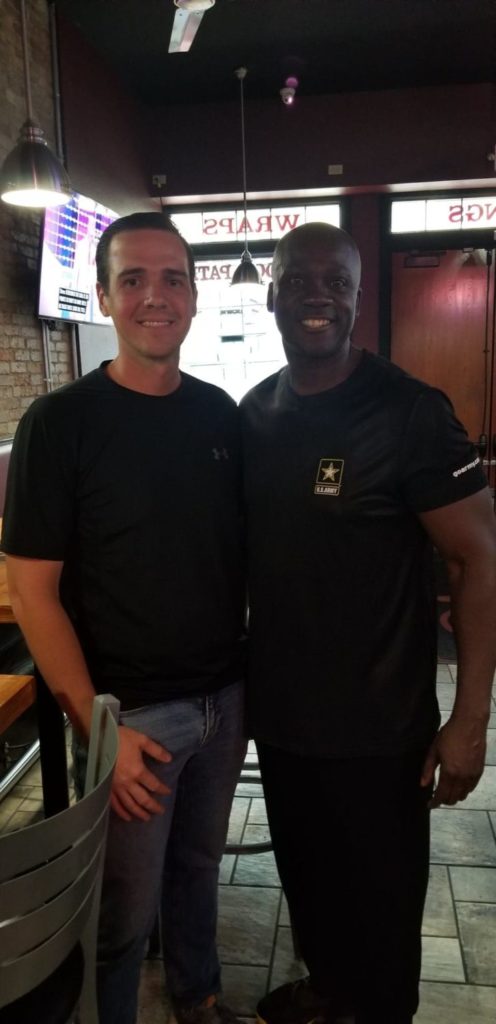
Harris apparently ended the confrontation after the “big Black guy” remark, at which time Lemke went to student government and reported what had happened. Harris received notice later in the day that he was placed on paid administrative leave pending the outcome of an investigation.
One of the VA work-study students apologized to Harris later that evening, writing, “I believe we both lost our barring (sic) there for a minute verbally, but I’m glad that we were able to sit down and discuss what was going on with all this.
In a federal Equal Employment Opportunities Commission filed by Harris on Monday, Harris wrote that Lemke’s allegations about the altercation were false and Lemke has “engaged in a pattern of racist and discriminatory conduct that has created a hostile work environment for me for several months.”
A former SVA officer said Lemke’s story doesn’t fit with what he knows of Harris.
“I’ve never found him to yell,” said Ryan Kreb, a former UWW student and officer of SVA in 2017. “I do know when he gets excited his voice gets louder. Not in the sense of yelling, but like anybody gets when they get excited and they talk louder … So I feel like it would be out of character for him to yell at somebody.”
Medical records indicate Harris has a diagnosed hearing loss and constant ringing in his ears. Records indicate that he has been criticized in the past for speaking too loudly, which he attributes to the hearing loss.
A Toxic Environment
Based on emails to and from Harris’s UW-Whitewater account over the past few months, the altercation seems to be the culmination of a long-running conflict over the use of space in Andersen Library on the UW-Whitewater campus dedicated to student veterans. In particular, Harris describes a dispute over a multimedia resource room and a veteran’s lounge space, both of which he was responsible for supervising. Both are intended to be open for all veterans, but Harris alleges in several emails that Lemke attempted to appropriate the space exclusively for members of the SVA, even moving library furniture into the multimedia space without permission of library staff.
Emails show that Harris worked with Lemke to find and secure alternative meeting and office space for SVA, but that Lemke had rejected those proposed spaces.
Lemke said his SVA chapter serves about 85 of the nearly 400 student-veterans on campus.
Emails show that Harris had attempted to make the multimedia resource center available for all veterans, including one in particular who suffered from PTSD and occasionally needed a quiet space to navigate panic attacks. Harris also requested that a phone be installed in the room for this student to be able to call counsellors from the Veterans Integration to Academic Learning (VITAL) Initiative, a program of the Veterans Administration.
Emails indicate that this request was denied by John Fons, UWW Interim Director of Continuing Education and Harris’s supervisor.
In another email to a campus administrator, Harris writes that safety became a concern.
“I started finding chairs arranged in the multi-media resource room to prevent (the) use of it (by the student with PTSD), a piece of paper with a scribbled message that VITAL was for ‘nut cases’ and part of the Navy Uniform Display that kept being removed and placed in the Multi-Media Resource Room (which I thought resembled a noose, but wasn’t sure until Curtis made an off-hand remark about it on Thursday),” Harris wrote. “I told John Fons about these incidents leading up to Thursday and he told me nothing could be proved and directed me not to discuss it with anyone else.”
Another student-veteran who asked not to be named said Lemke “went overboard trying to get Richard fired” and that Lemke had created a “toxic environment” around the veterans’ lounge. The student said a lot of younger student veterans decide not to join SVA for a variety of reasons, and that the organization does not represent or engage all student veterans.
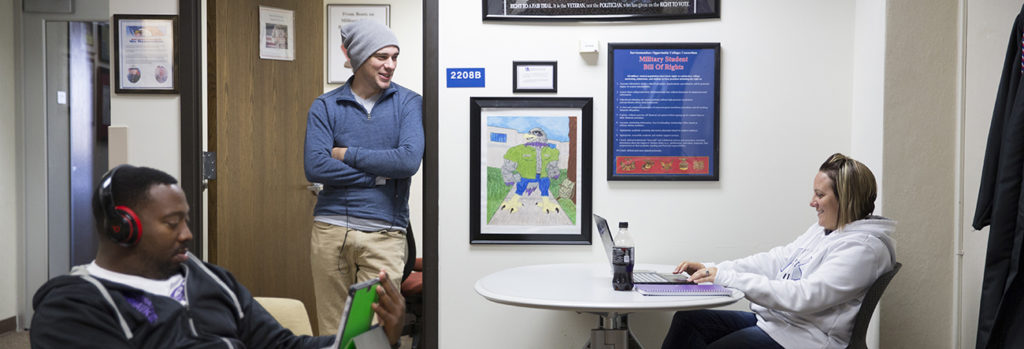
A hostile workplace
Records indicate that Harris has felt hostility and lack of support from his direct supervisor Fons as well as other university officials going back to the spring of 2019. In a whistleblower complaint filed with the state Department of Workforce Development on September 26, Harris alleges that Fons threatened to give him a negative performance evaluation, to make work conditions hostile, and to remove Harris’s authority over his own program’s budget.
Harris alleges that these threats came after Harris raised concerns about students in the UW-Whitewater master’s degree program in counselling and their interactions with veterans on campus.
Ryan Kreb, the former UWW student and former officer with the UWW chapter of the SVA, said SVA ran into an issue with the counselling students in 2017 when the counselling students did not handle confidentiality and recordkeeping properly, potentially putting veterans’ future careers in jeopardy.
Kreb said the student counsellors told the SVA that “it wasn’t therapy, it wasn’t psychiatric treatment or anything, it was just a support group, and explained that there was no paperwork involved other than a nondisclosure agreement to not discuss anything talked about in it.”
But that didn’t turn out to be the case, Kreb said.
“So we let them start, and within about a month and a week of them starting this, we come to find out that they actually were taking notes and stuff after the fact, and recordings on … the type of paperwork that falls under the kind you use for therapy sessions. A lot of our student veterans go for federal jobs once they graduate. And if they say (in federal job applications) no, (they didn’t have) any kind of mental health treatment, with this paperwork existing it would be a lie and they’d be lying in federal paperwork. And that’s a whole legal mess right there for them that can get them in a lot of trouble.”
Kreb said the SVA then went to the counselling department and demanded records be destroyed. He said at first the students denied taking notes and keeping records, but later department faculty told them the records would be destroyed. Even faculty balked at allowing the student veterans to witness the destruction of the records, but ultimately relented.
Nearly two years later, Harris had heard from a student who wanted to return to campus but was concerned about the student counselors. Harris had also heard other concerns related to the handling of confidentiality. Interim Chancellor Cheryl Green directed Harris to lay out concerns in an email to Brenda O’Beirne, the director of the counselling master’s degree program, which he did on May 30, 2019. In the email, Harris wrote that a student-veteran had expressed a desire to return to UWW to complete his undergraduate degree but that he had been involved in the 2017 debacle and wanted assurances that it wouldn’t be repeated.
Harris expressed additional concerns about the current crop of counselling students, as well.
“I would also like to inform you that several Student-Veterans that frequently use our Veterans Lounge have expressed concerns that students from the counseling program are showing up at the Lounge and recruiting them to take part in mental health groups. They have expressed that they feel the Lounge is not the place for recruiting for mental health services and that the recruiting in and of itself makes them feel that they are being targeted based on a stereotype that all Veterans have mental health problems,” Harris wrote.
Harris also wrote that some students were concerned that unlicensed students were running support groups that dealt with serious topics like suicide, military sexual assault, traumatic brain injury and depression. Additionally, Harris expressed concern at a “lack of understanding by the students as to possible adverse effect their participation in such groups could have on the security clearance of guard/reserve member of VA disability claim of a Student-Veteran.”
The whistleblower complaint alleges Fons began retaliation the next day, threatening a negative performance evaluation on May 31 and making other similar threats over the course of the summer.
In a May 31 email, Fons told Harris not to discuss the concerns about the student counselors “until we can hear the other side of the story.” Further, Fons wrote, “If you hear more about this or if other issues come up, please talk to me about them before reaching outside (Continuing Education) so we can develop a plan to have constructive conversations with others on campus.”
But in an email later that day, Chief Equity, Diversity and Inclusion Officer Kenny Yarbrough informed Fons that Harris had written the May 30 email to O’Beirne at the behest of the interim chancellor.
After he filed the whistleblower complaint alleging retaliation for raising concerns about the counselling program, Harris laid out more details in a Sept. 30 email to a number of campus administrators, mainly related to sloppy handling of confidentiality.
“After disclosing the above-listed incidents to staff in UW-Whitewater’s Chancellor’s Office John (Fons) has engaged in a persistent pattern of retaliation against me for the disclosures (which I have contemporaneously documented and reported),” Harris wrote. “John has even gone so far as to violate my client/patient rights with my VA Therapist by stating that discussing how the above incidents adversely impact my personal well-being will subject me to disciplinary action up to and including termination.”
Students said they had been interviewed in the past week as part of the investigation into Harris’s whistleblower complaint. Emails indicate that this week, UWW will conduct its first interviews in its investigation of the altercation between Harris and Lemke.

